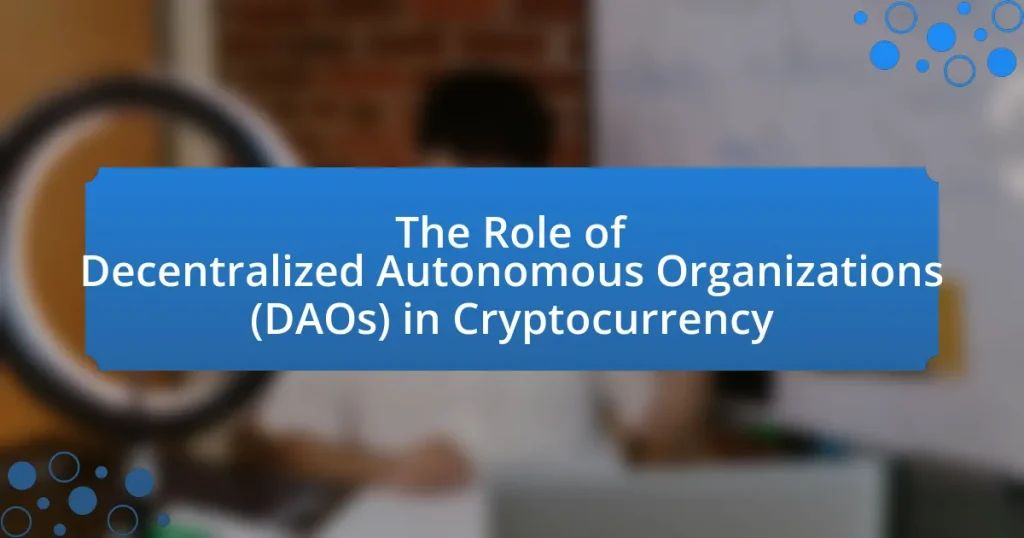Decentralized Autonomous Organizations (DAOs) are blockchain-based entities that facilitate collective decision-making through smart contracts, eliminating the need for centralized control. This article explores the functioning of DAOs within the cryptocurrency ecosystem, highlighting their governance structures, technological underpinnings, and the role of community participation. Key characteristics such as transparency, efficiency, and decentralized governance are examined, along with the advantages DAOs offer, including economic benefits and innovation in funding new projects. Additionally, the article addresses the challenges DAOs face, including regulatory issues and governance risks, while discussing their future prospects and best practices for participation.
--Decentralized-Autonomous-Organizations-(DAOs-1.webp)
What are Decentralized Autonomous Organizations (DAOs)?
Decentralized Autonomous Organizations (DAOs) are blockchain-based entities governed by smart contracts, enabling collective decision-making without centralized control. DAOs operate through a set of rules encoded on the blockchain, allowing members to propose and vote on changes or initiatives. This structure promotes transparency and democratization, as all transactions and decisions are recorded on the blockchain, ensuring accountability. DAOs have gained prominence in the cryptocurrency space, with notable examples like MakerDAO and Compound, which manage decentralized finance protocols and allow users to participate in governance through token ownership.
How do DAOs function within the cryptocurrency ecosystem?
Decentralized Autonomous Organizations (DAOs) function within the cryptocurrency ecosystem by enabling collective decision-making through smart contracts on blockchain networks. DAOs operate without centralized control, allowing token holders to propose and vote on governance issues, such as funding projects or modifying protocols. This structure promotes transparency and accountability, as all transactions and decisions are recorded on the blockchain. For example, the DAO hack in 2016 highlighted both the potential and risks of this model, leading to significant discussions about security and governance in decentralized systems.
What technologies underpin the operation of DAOs?
Decentralized Autonomous Organizations (DAOs) operate primarily on blockchain technology, which provides a secure and transparent ledger for transactions and governance. Smart contracts, self-executing contracts with the terms of the agreement directly written into code, facilitate automated decision-making and enforce rules without intermediaries. Additionally, decentralized governance frameworks enable token holders to participate in decision-making processes, ensuring that control is distributed among members rather than centralized. These technologies collectively ensure that DAOs function autonomously and transparently, aligning with the principles of decentralization in cryptocurrency ecosystems.
How do smart contracts facilitate DAO governance?
Smart contracts facilitate DAO governance by automating decision-making processes and enforcing rules without the need for intermediaries. They enable transparent and tamper-proof execution of governance protocols, allowing members to propose, vote on, and implement changes in a decentralized manner. For instance, when a member submits a proposal, the smart contract automatically verifies the voting criteria and executes the outcome based on the majority decision, ensuring that all actions are recorded on the blockchain for accountability. This mechanism enhances trust among participants and streamlines governance operations, as evidenced by DAOs like MakerDAO, which utilize smart contracts to manage their governance and collateralized debt positions effectively.
What are the key characteristics of DAOs?
Decentralized Autonomous Organizations (DAOs) are characterized by their decentralized governance, smart contract functionality, and community-driven decision-making. Decentralized governance allows members to participate in the decision-making process without a central authority, ensuring that power is distributed among stakeholders. Smart contracts automate operations and enforce rules transparently, reducing the need for intermediaries. Community-driven decision-making fosters collaboration and collective input, enabling members to propose and vote on initiatives. These characteristics enhance transparency, security, and efficiency in organizational operations, aligning with the principles of blockchain technology.
How does decentralization impact decision-making in DAOs?
Decentralization significantly enhances decision-making in DAOs by distributing authority among all members rather than concentrating it in a single entity. This structure allows for more democratic participation, as each member can propose and vote on initiatives, leading to decisions that reflect the collective interests of the community. Research indicates that decentralized governance can improve transparency and accountability, as all actions and proposals are recorded on the blockchain, making them accessible for scrutiny. For instance, a study by the MIT Media Lab found that decentralized decision-making in organizations can lead to increased innovation and responsiveness to member needs, as diverse perspectives are considered in the decision-making process.
What role does community participation play in DAOs?
Community participation is essential in Decentralized Autonomous Organizations (DAOs) as it drives decision-making, governance, and resource allocation. In DAOs, members collectively propose, vote on, and implement changes, ensuring that the organization reflects the interests and values of its community. This participatory model enhances transparency and accountability, as decisions are made openly and collaboratively. Research indicates that DAOs with higher community engagement tend to achieve better outcomes, as diverse perspectives contribute to more robust solutions and innovations. For instance, the DAO known as MakerDAO relies on community voting to manage its stablecoin, demonstrating how active participation directly influences operational effectiveness and sustainability.
What advantages do DAOs offer in the cryptocurrency space?
DAOs offer several advantages in the cryptocurrency space, including enhanced transparency, increased efficiency, and decentralized governance. Transparency is achieved through blockchain technology, which allows all transactions and decisions to be publicly accessible and verifiable. This reduces the risk of fraud and increases trust among participants. Increased efficiency stems from automated processes governed by smart contracts, which streamline operations and reduce the need for intermediaries. Decentralized governance empowers stakeholders to participate in decision-making, ensuring that power is distributed rather than concentrated, which can lead to more democratic and equitable outcomes. These advantages contribute to the growing adoption and effectiveness of DAOs in the cryptocurrency ecosystem.
How do DAOs enhance transparency and trust among users?
DAOs enhance transparency and trust among users by utilizing blockchain technology to ensure that all transactions and decisions are recorded in an immutable ledger. This transparency allows users to independently verify actions taken by the organization, fostering a sense of accountability. For instance, smart contracts automate processes and enforce rules without the need for intermediaries, reducing the risk of manipulation. According to a study by the World Economic Forum, the transparency provided by blockchain can significantly increase user confidence, as it allows for real-time auditing and oversight of organizational activities.
What economic benefits do DAOs provide to their members?
Decentralized Autonomous Organizations (DAOs) provide economic benefits to their members through profit-sharing mechanisms, reduced operational costs, and enhanced governance participation. Members often receive a share of the profits generated by the DAO’s activities, which can lead to financial gains proportional to their contributions or investments. Additionally, DAOs typically operate with lower overhead costs compared to traditional organizations, allowing for more efficient allocation of resources. Furthermore, members have a direct say in decision-making processes, which can lead to more favorable economic outcomes aligned with their interests. For instance, a study by the Blockchain Research Institute highlights that DAOs can streamline processes and reduce the need for intermediaries, thus maximizing member returns.

How are DAOs transforming traditional organizational structures?
DAOs are transforming traditional organizational structures by decentralizing decision-making and governance, allowing for greater transparency and inclusivity. Unlike conventional organizations that rely on hierarchical management, DAOs operate on blockchain technology, enabling members to participate in governance through smart contracts and voting mechanisms. This shift promotes a more democratic approach, where stakeholders can directly influence decisions without the need for intermediaries. For instance, a study by the World Economic Forum highlights that DAOs can reduce operational costs and increase efficiency by automating processes through code, thus streamlining organizational functions.
What challenges do DAOs face compared to traditional organizations?
DAOs face several challenges compared to traditional organizations, primarily related to governance, legal recognition, and operational efficiency. Governance in DAOs often relies on consensus mechanisms, which can lead to slower decision-making processes and difficulties in achieving agreement among diverse stakeholders. Legal recognition poses a significant challenge, as many jurisdictions do not yet have clear frameworks for DAOs, resulting in potential regulatory uncertainties and liabilities. Additionally, operational efficiency can be hindered by the reliance on smart contracts and blockchain technology, which may introduce technical complexities and vulnerabilities. These challenges highlight the differences in structure and function between DAOs and traditional organizations, where centralized authority typically streamlines decision-making and legal compliance.
How do regulatory issues affect the operation of DAOs?
Regulatory issues significantly impact the operation of Decentralized Autonomous Organizations (DAOs) by influencing their legal status, compliance requirements, and operational frameworks. For instance, jurisdictions may classify DAOs as securities or companies, which imposes specific regulatory obligations such as registration, reporting, and governance standards. The U.S. Securities and Exchange Commission (SEC) has indicated that certain tokens issued by DAOs could be considered securities, leading to potential legal repercussions for non-compliance. Furthermore, regulatory uncertainty can deter investment and participation in DAOs, as stakeholders may be wary of potential legal risks. This regulatory landscape shapes how DAOs structure their governance, manage funds, and interact with users, ultimately affecting their sustainability and growth within the cryptocurrency ecosystem.
What are the risks associated with DAO governance models?
DAO governance models face several risks, including centralization, security vulnerabilities, and governance attacks. Centralization occurs when a small group of participants holds a disproportionate amount of voting power, undermining the decentralized ethos of DAOs. Security vulnerabilities arise from smart contract bugs or exploits, which can lead to significant financial losses; for instance, the DAO hack in 2016 resulted in a loss of $60 million due to a flaw in the smart contract code. Governance attacks, such as Sybil attacks, can manipulate decision-making processes by creating multiple identities to gain undue influence. These risks highlight the challenges in ensuring effective and secure governance within DAOs.
How do DAOs promote innovation in the cryptocurrency sector?
DAOs promote innovation in the cryptocurrency sector by enabling decentralized decision-making and funding mechanisms that empower community-driven projects. This structure allows for rapid experimentation and adaptation, as stakeholders can propose and vote on new ideas without the constraints of traditional corporate governance. For instance, projects like MakerDAO and Compound have successfully utilized DAO frameworks to innovate in decentralized finance (DeFi), leading to the creation of new financial products and services. The flexibility and inclusivity of DAOs facilitate a diverse range of contributions, driving technological advancements and fostering a collaborative ecosystem that accelerates the overall growth of the cryptocurrency sector.
What role do DAOs play in funding new projects and startups?
DAOs play a crucial role in funding new projects and startups by enabling decentralized decision-making and collective investment. Through smart contracts, DAOs allow members to pool resources and vote on funding proposals, ensuring that capital is allocated based on community consensus rather than traditional hierarchical structures. For instance, platforms like MolochDAO and The DAO have demonstrated this model by successfully funding various blockchain projects, showcasing the effectiveness of community-driven funding mechanisms. This approach not only democratizes access to capital but also aligns the interests of investors and project creators, fostering innovation in the cryptocurrency space.
How do DAOs facilitate collaboration among developers and users?
DAOs facilitate collaboration among developers and users by enabling decentralized decision-making and governance through smart contracts. This structure allows all stakeholders to participate in the development process, propose changes, and vote on key issues, ensuring that the interests of both developers and users are represented. For instance, platforms like MakerDAO and Aragon exemplify how DAOs empower users to influence project direction and resource allocation, fostering a sense of community and shared ownership. The transparency of blockchain technology further enhances trust, as all actions and decisions are recorded and accessible, promoting accountability among participants.

What are the future prospects for DAOs in cryptocurrency?
The future prospects for Decentralized Autonomous Organizations (DAOs) in cryptocurrency are promising, as they are expected to enhance governance, increase transparency, and facilitate decentralized decision-making. DAOs leverage blockchain technology to enable collective ownership and management of assets, which can lead to more democratic and efficient organizational structures. According to a report by the World Economic Forum, the market for DAOs is projected to grow significantly, driven by the increasing adoption of decentralized finance (DeFi) and the need for more inclusive governance models. This growth is evidenced by the rise of successful DAOs like MakerDAO and Uniswap, which have demonstrated the viability of decentralized governance in managing substantial financial ecosystems.
How might DAOs evolve in response to market trends?
DAOs may evolve by adopting more flexible governance structures and integrating advanced technologies to respond to market trends. As the cryptocurrency market becomes increasingly volatile, DAOs could implement adaptive decision-making processes that allow for quicker responses to market changes, such as adjusting funding allocations or project priorities based on real-time data. For instance, the rise of decentralized finance (DeFi) has prompted many DAOs to incorporate yield farming and liquidity provision strategies, enhancing their financial sustainability. Additionally, the growing emphasis on regulatory compliance may lead DAOs to develop frameworks that align with legal standards while maintaining decentralization, ensuring they can operate effectively within evolving market conditions.
What technological advancements could enhance DAO functionality?
Technological advancements that could enhance DAO functionality include improved smart contract capabilities, interoperability protocols, and decentralized identity solutions. Enhanced smart contracts can automate complex governance processes and reduce the need for manual intervention, thereby increasing efficiency. Interoperability protocols enable DAOs to interact seamlessly with other blockchain networks, facilitating broader collaboration and resource sharing. Decentralized identity solutions provide secure and verifiable identities for participants, enhancing trust and accountability within the DAO ecosystem. These advancements are supported by ongoing developments in blockchain technology, such as Ethereum 2.0, which aims to improve scalability and transaction speed, further bolstering DAO operations.
How can DAOs adapt to changing regulatory environments?
DAOs can adapt to changing regulatory environments by implementing flexible governance structures that allow for rapid decision-making and compliance adjustments. This adaptability is crucial as regulations evolve, requiring DAOs to modify their operational frameworks, such as voting mechanisms and membership criteria, to align with legal standards. For instance, DAOs can establish legal entities in jurisdictions with favorable regulations, enabling them to operate within the law while maintaining their decentralized nature. Additionally, DAOs can engage with regulators proactively, participating in discussions to shape policies that affect their operations. This approach not only ensures compliance but also fosters a collaborative relationship with regulatory bodies, which can lead to more favorable outcomes for the DAO ecosystem.
What best practices should be followed when participating in a DAO?
When participating in a DAO, best practices include thorough research, active engagement, and adherence to governance protocols. Participants should familiarize themselves with the DAO’s mission, structure, and decision-making processes to make informed contributions. Engaging actively in discussions and voting on proposals ensures that members influence the direction of the organization effectively. Additionally, following established governance protocols, such as respecting the consensus mechanisms and participating in community guidelines, fosters a collaborative environment. These practices enhance the overall effectiveness and sustainability of the DAO, as evidenced by successful DAOs that prioritize member involvement and transparent governance.
How can members ensure effective governance within a DAO?
Members can ensure effective governance within a DAO by actively participating in decision-making processes and adhering to established protocols. Active participation includes voting on proposals, engaging in discussions, and contributing to the development of governance frameworks. Adhering to established protocols ensures that all actions are transparent and accountable, fostering trust among members. Research indicates that DAOs with clear governance structures and active member engagement tend to perform better, as evidenced by the success of platforms like MakerDAO, which has implemented robust governance mechanisms that allow for member input and oversight.
What strategies can be employed to mitigate risks in DAO participation?
To mitigate risks in DAO participation, individuals can employ strategies such as conducting thorough due diligence, diversifying investments, and actively engaging in governance. Conducting due diligence involves researching the DAO’s structure, team, and past performance to assess its legitimacy and potential risks. Diversifying investments across multiple DAOs can reduce exposure to any single project’s failure, thereby spreading risk. Actively engaging in governance allows participants to influence decisions and stay informed about the DAO’s operations, which can help identify and address potential issues early. These strategies are supported by the increasing recognition of the importance of risk management in decentralized finance, as highlighted in various studies on investment strategies in blockchain ecosystems.
It is not possible to provide an answer to the question “
” as it does not contain a specific inquiry or context to address.


